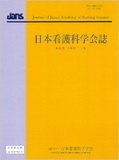Japanese
English
- 販売していません
- Abstract 文献概要
- 参考文献 Reference
要旨
目的:訪問看護を利用する要介護高齢在宅療養者の認知機能や家族の負担感に配慮した口腔衛生状態の向上に向けた口腔ケア方法を検討すること.
方法:要介護高齢在宅療養者の口腔内の治療およびケアに携わる歯科医師(口腔外科を含む),歯科衛生士,訪問看護師の計32人を研究協力者とし,全3ラウンドから構成されるデルファイ法を用いた質問紙調査を行った.
結果:全ラウンドを通じ,31人(参加率96.8%)以上から回答を得た.最終ラウンドで同意率80%以上だったのは8領域59項目であった.うち,コンセンサスレベル「最高」は誤嚥性肺炎の再燃リスクに関する1項目,「高」は手技や口腔内症状への対応,ケアへの拒否があり認知機能が低下する者への対応など,58項目であった.
結論:口腔ケアの事前準備や手技,出血など症状への対応,拒否など認知機能が低下した対象者への対応,誤嚥性肺炎予防に関する支援の必要性が示唆された.
Objective: To examine oral care practices for improving the oral hygiene of older adult patients requiring nursing care who use visiting nursing services, considering their cognitive functions and family burden.
Methods: A three-round questionnaire survey using the Delphi method was administered to 32 people, who were dentists (including those specialized in oral surgery), dental hygienists, and home health care nurses involved in oral health treatment and care of older adult patients requiring nursing care.
Results: Approximately all participants participated in the three rounds (response rate: 96.8%). In the final round, the agreement rate was 80% or higher for 59 items across 8 domains. Of these, one item— the risk of recurrence of aspiration pneumonia—was at the “highest” consensus level, whereas a “high” consensus level was noted for the remaining 58 items, including techniques, handling of oral symptoms, and handling of participants with cognitive decline, for example, refusal of care.
Conclusions: The results suggest the need for support related to oral care preparation and techniques, handling of symptoms such as bleeding, handling the behavior of participants with declining cognitive function, such as refusal, and prevention of aspiration pneumonia.
Copyright © 2022, Japan Academy of Nursing Science. All rights reserved.


